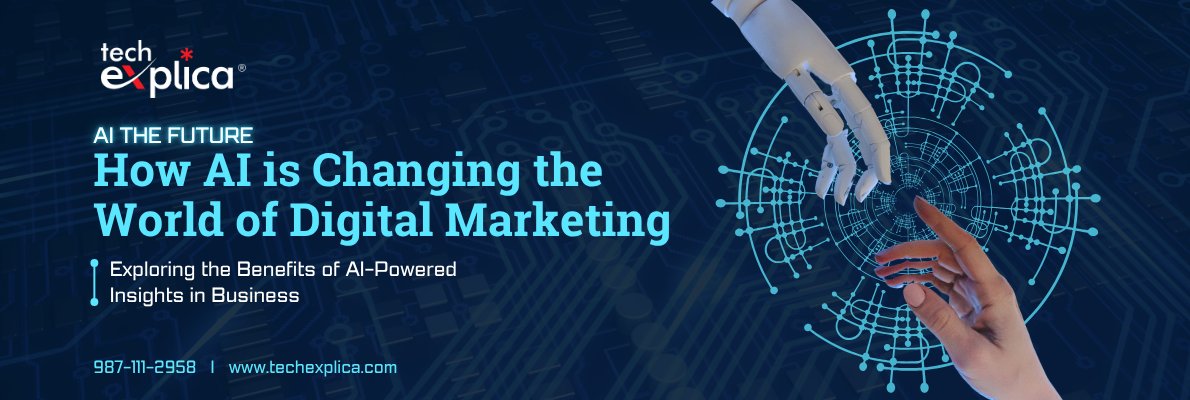In recent years, Artificial Intelligence (AI) has evolved from being a futuristic concept to a transformative force in nearly every industry. Among the fields most profoundly impacted is digital marketing. The way brands interact with consumers, craft campaigns, and measure results has fundamentally shifted thanks to AI-powered tools and algorithms. This blog explores how AI is revolutionizing digital marketing, driving efficiency, personalization, and ultimately, better ROI.
1. Smarter Customer Insights and Data Analytics
Digital marketing thrives on data, and AI has made it possible to process and interpret vast amounts of it at unprecedented speed and accuracy. Traditional analytics tools could show what happened; AI tools can now predict what will happen.
Machine learning algorithms analyze user behavior across websites, social media, and e-commerce platforms to generate deep insights. Marketers can understand consumer preferences, anticipate needs, and segment audiences with precision. This leads to more targeted campaigns, reduced ad spend waste, and improved customer satisfaction.
2. Hyper-Personalization at Scale
AI enables brands to deliver highly personalized content and experiences to individual users in real time. Personalization once meant simply including a user’s name in an email. Now, AI-powered systems can tailor entire product recommendations, content feeds, and promotional offers based on a user’s history, preferences, and behavior.
Tools like recommendation engines (e.g., those used by Amazon or Netflix) show how AI can predict what users want before they ask for it. In email marketing, AI can optimize send times, subject lines, and content to maximize open rates and conversions. This level of personalization fosters deeper customer engagement and brand loyalty.
3. Chatbots and Conversational Marketing
AI-powered chatbots are redefining customer service and lead generation. Available 24/7, these virtual assistants can handle thousands of customer queries simultaneously, provide instant responses, and even guide users through purchase decisions.
Unlike traditional chat systems, modern AI chatbots use Natural Language Processing (NLP) to understand context, sentiment, and intent, making interactions feel more human. They can also learn over time, becoming more effective with each interaction.
Businesses across industries are leveraging chatbots on websites, messaging apps, and social media to drive conversions and improve user experience.
4. Predictive and Programmatic Advertising
AI is at the core of programmatic advertising, which automates the buying and placement of ads in real time. Through AI algorithms, marketers can bid for ad space more efficiently, targeting specific demographics and behaviors across multiple platforms.
Predictive analytics takes this further by anticipating user actions. For example, if a customer frequently visits an online store but hasn’t made a purchase, AI can trigger retargeting ads or personalized offers likely to convert that user.
This automation not only saves time and budget but also significantly improves the effectiveness of ad campaigns.
5. Content Generation and Curation
AI is increasingly capable of creating content, from product descriptions to full-length articles. Tools like GPT (Generative Pre-trained Transformers) can generate human-like text, while AI design tools can create visuals, videos, and social media graphics.
Although AI-generated content may still require human oversight for tone and context, it vastly speeds up the production process. Additionally, AI can curate content by analyzing user preferences and suggesting the most relevant articles, videos, or social posts for each individual.
6. Voice Search and Visual Recognition
With the rise of voice assistants like Siri, Alexa, and Google Assistant, optimizing for voice search has become essential. AI enables these systems to understand natural language queries and provide accurate results.
Marketers must now consider how users speak, not just how they type. AI helps adapt SEO strategies to match voice search patterns, ensuring content remains discoverable.
Similarly, AI-powered visual recognition allows users to search using images instead of keywords. Platforms like Pinterest and Google Lens are leading this trend, and savvy marketers are optimizing their content accordingly.
7. Enhanced Customer Journey Mapping
AI tools can track and analyze every step of a customer’s journey—from first interaction to final purchase and beyond. This granular visibility enables marketers to identify drop-off points, optimize touchpoints, and create more seamless experiences.
By integrating AI across CRM systems, email marketing, social media, and web analytics, brands can build dynamic customer journey maps that adapt in real time based on user behavior.
8. AI-Driven SEO Optimization
Search engine algorithms themselves are powered by AI, which means SEO strategies must evolve accordingly. AI tools can now perform keyword research, analyze competitor performance, and suggest content optimizations more effectively than manual methods.
They can also detect trends, recommend internal linking structures, and even auto-generate meta descriptions and tags. This not only improves rankings but also saves marketers countless hours.
9. Fraud Detection and Brand Safety
Digital advertising is vulnerable to fraud, including click fraud, fake leads, and bots. AI can detect suspicious patterns in real time and prevent fraudulent activity before it impacts a campaign.
Moreover, AI helps ensure brand safety by scanning content across placements and blocking ads from appearing alongside inappropriate or harmful content.
10. Continuous Learning and Campaign Optimization
One of AI’s greatest strengths is its ability to learn and adapt over time. AI systems analyze campaign performance continuously, adjusting parameters and targeting criteria to improve results with minimal human intervention.
This creates a feedback loop where every campaign becomes smarter and more effective, enabling marketers to scale with confidence.
Conclusion: The Future of Digital Marketing is Intelligent
Artificial Intelligence is not just a tool; it’s becoming the foundation of modern digital marketing. From personalized experiences to automated campaign management and predictive insights, AI empowers marketers to be more strategic, efficient, and customer-focused.
As the technology continues to evolve, so too will the opportunities for those who embrace it.
If you’re looking to stay ahead in the world of digital marketing and master the use of AI tools, consider joining Tech Explica Institute. With expert-led courses and practical training, it’s your gateway to becoming a future-ready digital marketing professional.







